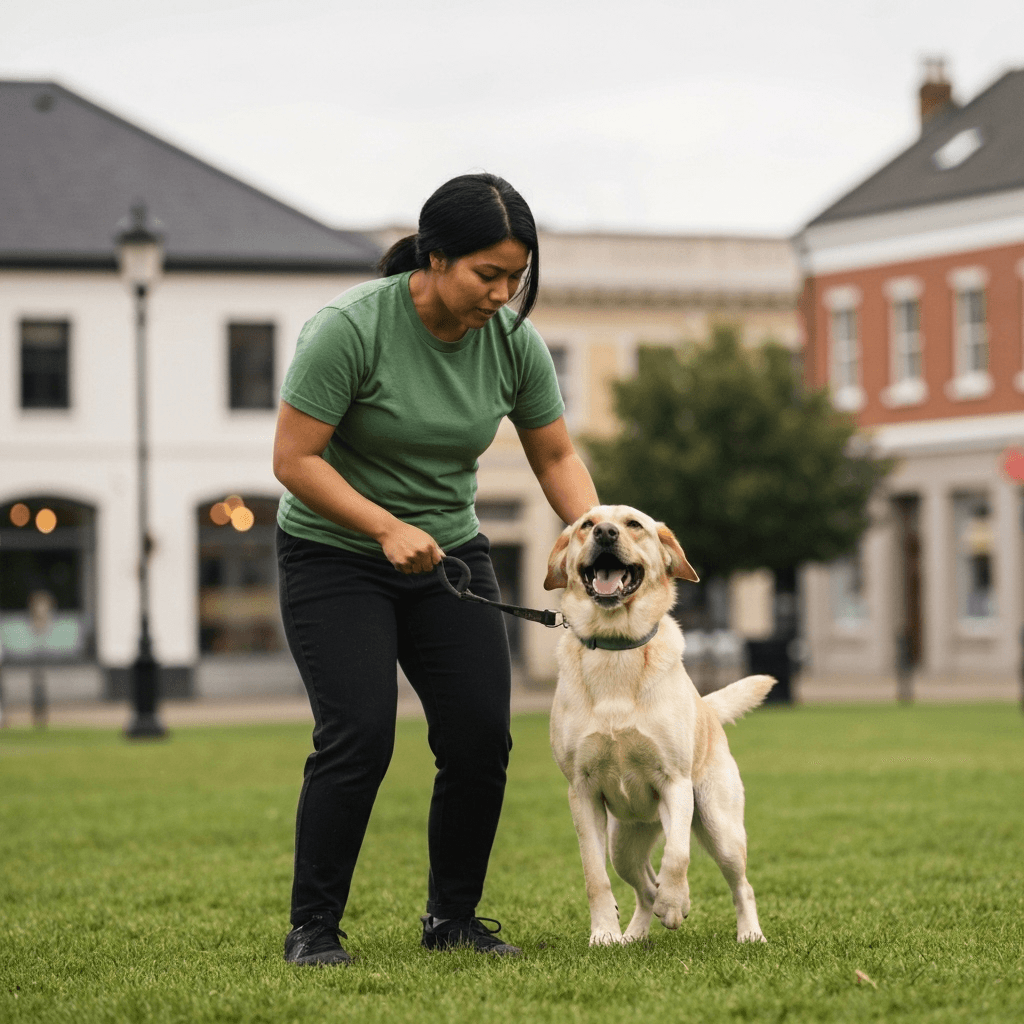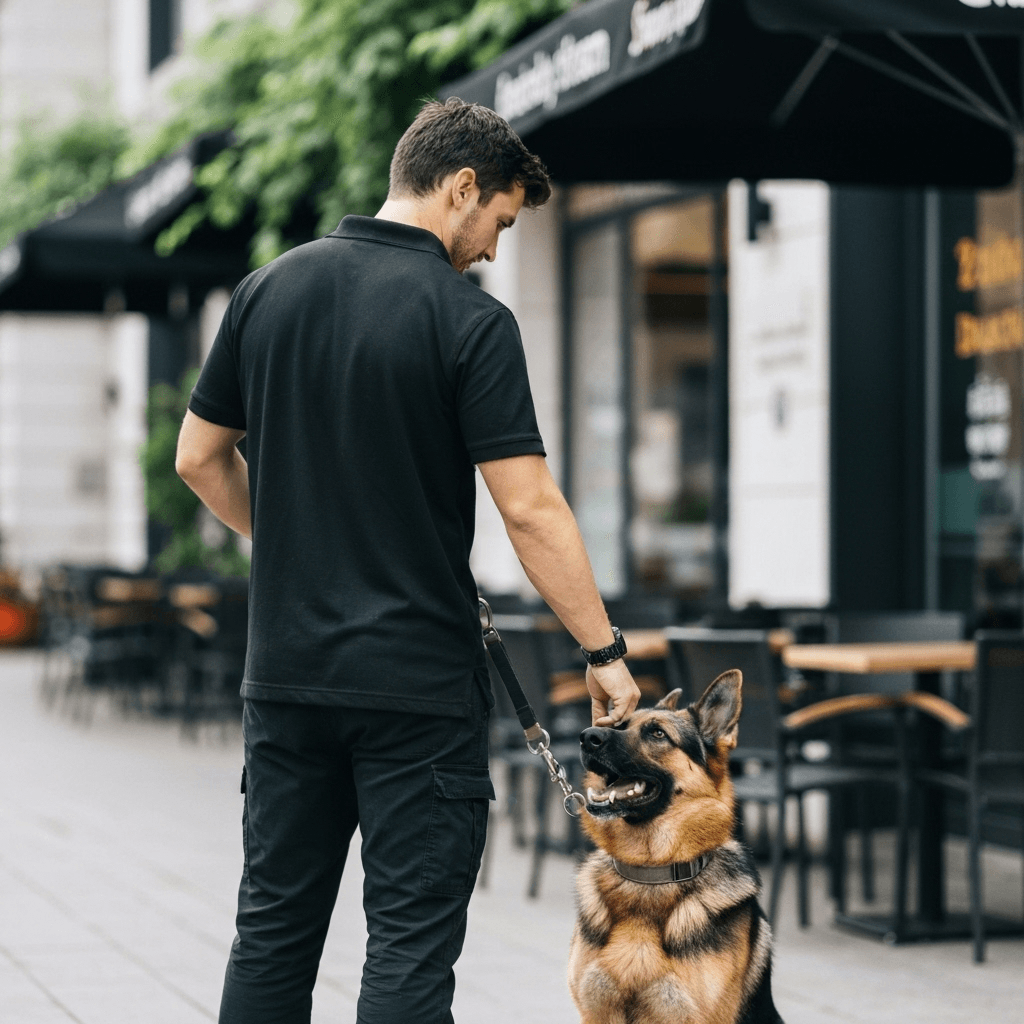Your Complete Guide to Choosing a Dog Trainer in Syracuse
Living with a dog in Syracuse means navigating busy sidewalks near Syracuse University, game-day crowds around the Dome, and tight city blocks in Tipp Hill, Westcott, and Eastwood. Training that fits this lifestyle helps your dog stay calm on walks, settle in apartments, and handle distractions around Armory Square and neighborhood parks.
How to Choose the Right Trainer
The best trainers use positive reinforcement methods and understand how to work around Syracuse’s unique environment. They know that what works in a quiet suburban yard might not translate to a busy Marshall Street sidewalk or a cramped apartment hallway.
Start by looking for trainers with recognized credentials like CPDT-KA, KPA-CTP, or behavior-focused certifications such as IAABC-CDBC and CBCC-KA. These credentials show the trainer has studied science-based methods and continues learning through education requirements.
In-home training works especially well for city dogs because it addresses real problems in real places. Your trainer can help with door manners when delivery drivers arrive, elevator etiquette in your building, and leash skills on your actual walking route. Group classes make more sense once your dog can focus around distractions, which prepares them for busy places like Clinton Square during events.
If you’re considering park-based training sessions, make sure your trainer has the required permits and insurance to work in city or county facilities. This protects both of you and shows they operate professionally.
Common Dog Training Methods Explained

Reward-based training builds the trust and reliable responses you need when navigating dense city spaces. It also helps you follow Syracuse’s leash and noise ordinances without constant stress.
Basic obedience covers the essentials: sit, down, stay, place, recall, and polite leash walking. These skills make the difference between a pleasant stroll through Armory Square and a frustrating tug-of-war down the sidewalk.
Puppy training focuses on early socialization, house training, crate comfort, and gentle leash introduction. Young dogs need short, positive sessions that build confidence around the sights and sounds they’ll encounter throughout the city.
Behavior modification takes a more specialized approach to challenges like reactivity, fearfulness, resource guarding, and separation anxiety. These programs use careful desensitization and counter-conditioning to change how your dog feels about triggers, not just how they act.
Private lessons and in-home sessions let trainers customize their approach to your specific situation. They can work around your building’s rules, your neighborhood’s particular distractions, and your dog’s individual needs.
Group classes help dogs learn to focus around other animals and people in a controlled setting. Think of them as practice for the real world, where you’ll encounter other dogs on narrow sidewalks and crowded crosswalks.
Day training programs and limited board-and-train options can jumpstart your dog’s education, but success depends on clear communication and follow-up homework. The trainer should teach you how to maintain the new skills once your dog comes home.
Specialized programs like service dog training require structured public-access work, clear legal understanding, and consistent implementation. These programs demand more time and expertise than basic pet training.
Avoid trainers who rely on fear, pain, or intimidation. These methods can backfire in crowded public spaces and often create new behavioral problems down the road.
Average Cost of Dog Training in Syracuse (Updated for 2025)
Training costs vary based on the trainer’s experience, session length, location, and your dog’s specific needs. Expect to pay slightly more for complex behavior cases or if your trainer needs to travel outside central Syracuse into outer areas of Onondaga County.
| Service Type | Average Cost (Syracuse and Onondaga County) |
|---|---|
| Puppy classes 4–6 weeks | $150–$275 total |
| Group obedience classes 4–6 weeks | $160–$300 total |
| Private lessons 60–90 min | $95–$170 per session |
| In-home coaching packages 4–6 visits | $420–$900 total |
| Day training per week | $450–$950 per week |
| Behavior consult initial | $130–$220 |
| Board and train 2–4 weeks | $1,900–$4,200 total |
When comparing prices, ask what’s included in each package. Some trainers provide written homework, follow-up support, or practice materials. Others charge separately for travel time, parking fees, or additional consultations. Many offer a free initial consultation where you can meet them and discuss your goals before committing to a program.
Questions to Ask a Potential Dog Trainer
- What training methods do you use, and how do you keep sessions positive and low-stress?
- What credentials do you hold? Do you pursue continuing education through programs like CPDT-KSA or CTC?
- How will you adapt your approach to my Syracuse neighborhood and my building’s specific rules?
- Do you offer private lessons, group classes, or day training, and which option fits my goals and schedule?
- How will we measure progress and decide when to add distractions like the University area or downtown events?
- What are the total costs, including any travel fees, materials, or cancellation policies?
- Do you carry liability insurance, and can you provide proof of coverage?
- If my dog shows reactivity or aggression, will you coordinate with my veterinarian or refer to a veterinary behaviorist?
- If you train in public parks, do you have the required permits for city or county facilities?
Local Syracuse Rules and Considerations
Syracuse sits in Onondaga County, New York, where dog regulations combine city ordinances with state health requirements. Understanding these rules helps you train your dog appropriately and avoid potential problems.
Dogs must remain on leash in all public areas unless they’re inside a designated off-leash dog park. You’re required to pick up and properly dispose of pet waste throughout the city. Excessive barking, roaming, or aggressive behavior can result in nuisance citations from animal control officers.
New York State requires current rabies vaccination for all dogs. The City of Syracuse also requires licensing for dogs four months and older, which you can obtain through the city clerk’s office with proof of vaccination.
Commercial dog training in city or county parks typically requires permits and proof of liability insurance. Your trainer should handle these requirements, but it’s worth confirming before you start outdoor sessions.
For current enforcement information and reporting procedures, check the City’s Animal Control page. The New York State Department of Health provides statewide vaccination requirements and bite reporting protocols.
County park rules and dog area information are available through Onondaga County Parks, especially if you plan to use facilities like the Wegmans Good Dog Park for training practice.
Local Syracuse Resources for Dog Owners
Syracuse offers several excellent venues for training practice and exercise. Wegmans Good Dog Park at Onondaga Lake Park in Liverpool provides a safe, fenced environment for recall practice and socialization. The Jamesville Beach Off-Leash Dog Park in Jamesville offers another controlled space for off-leash work.
For on-leash training with real-world distractions, try Thornden Park, Elmwood Park, or the trails around Onondaga Lake Park. Green Lakes State Park in nearby Fayetteville offers calmer trail walking for dogs who need to build focus gradually.
The City of Syracuse handles dog licensing through the City Clerk’s office for all dogs four months and older. The Onondaga County Health Department provides rabies clinics and handles bite reporting and investigation.
Practice walks through neighborhoods like Westcott, Eastwood, Tipp Hill, and the Northside help dogs generalize their leash manners and social skills. Each area offers different challenges, from busy commercial strips to quiet residential blocks.

Common Questions About Dog Training in Syracuse
How much does in-home dog training cost?
Most Syracuse trainers charge between $95 and $170 per visit for private, in-home sessions. Many offer package deals for multiple visits, which can reduce the per-session cost and provide better value for comprehensive training programs.
Is in-home dog training worth it?
In-home training works especially well for city dogs because you address problems where they actually happen. Instead of wondering whether your dog will remember their classroom manners when you get home, you practice door greetings, hallway behavior, and elevator etiquette in your actual living space.
Can you pay someone to house train your dog?
Many trainers offer puppy programs that include house training, crate training, and daily routine development. Day training can speed up the process while teaching you how to maintain consistency when you take over the daily care.
What is the 3-3-3 rule for dog training?
This guideline suggests dogs need roughly three days to decompress from major changes, three weeks to learn new routines, and three months to fully settle into their environment. Good training programs respect this timeline, especially when working with newly adopted dogs.
How long will it take to reach my training goals?
Well-socialized puppies and adult dogs with basic behavioral challenges often show solid progress in four to eight weeks with consistent daily practice. Dogs with reactivity, aggression, or severe anxiety typically need several months of structured behavior modification work.
What should I bring to group classes?
Pack a flat collar or harness, a standard six-foot leash, high-value treats your dog loves, water for both of you, and vaccination records if your trainer requests them. Leave retractable leashes at home since they can create safety issues in group settings.
What’s the leash law in Syracuse?
Syracuse requires leashes in all public areas unless you’re inside a designated off-leash dog park. A standard six-foot leash works best for sidewalks, parks, and public events where you need reliable control.
Do I need a dog license in Syracuse or Onondaga County?
Dogs four months and older must be licensed with the City of Syracuse if you live within city limits. You’ll need current rabies vaccination records to obtain the license through the city clerk’s office.
What shots does my dog need in Onondaga County or New York?
New York State requires rabies vaccination for all dogs. Your veterinarian may recommend additional vaccines like distemper-parvo and bordetella based on your dog’s lifestyle, age, and exposure to other animals through daycare or boarding facilities.
Are dog trainers required to be licensed in Syracuse or Onondaga County or New York?
New York doesn’t issue specific licenses for dog trainers. Trainers must follow standard business regulations, and those offering board-and-train services or using public parks for commercial sessions may need facility permits and liability insurance coverage.
Where can I practice off-leash recall?
Stick to fully fenced dog parks like Wegmans Good Dog Park or Jamesville Beach Off-Leash Dog Park. Visit during quieter hours when you’re starting recall training to reduce distractions and set your dog up for success.
Which dog parks allow training around Syracuse?
Both Wegmans Good Dog Park and Jamesville Beach Off-Leash Dog Park welcome training activities as long as you follow posted rules and give other park users space. Keep training sessions low-key and positive to maintain a good environment for everyone.
What beaches and trails allow dogs for training?
Most trails at Onondaga Lake Park and Green Lakes State Park welcome leashed dogs for training walks. Beach access for dogs is often limited or seasonal, so always check posted signs and current regulations before visiting waterfront areas.
What qualifications should I look for in a professional dog trainer?
Look for trainers with recognized certifications like KPA-CTP, CPDT-KA, IAABC-CDBC, CBCC-KA, or science-based programs like CTC. These credentials show the trainer has studied humane, effective methods and commits to ongoing education.
Do trainers need insurance in Syracuse?
While New York doesn’t mandate specific insurance for dog trainers, reputable professionals carry general liability coverage and often care, custody, and control policies. Trainers working in city or county parks usually need to provide proof of insurance to obtain required permits.
Finding the right trainer for your Syracuse dog means looking for someone who understands both effective training methods and the realities of city living. Focus on positive, science-based approaches, clear communication about goals and progress, and consistent practice in the environments where your dog actually lives. With the right guidance and commitment, your dog can become a confident, well-mannered companion anywhere in the city.
